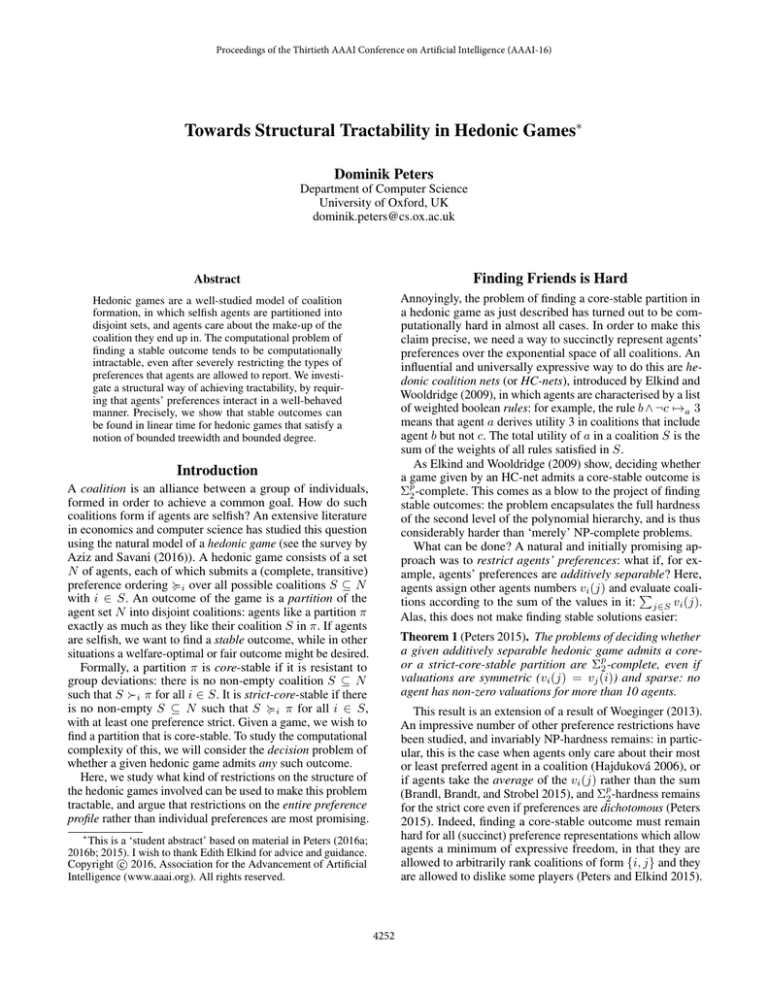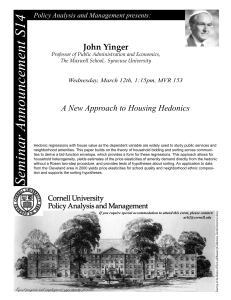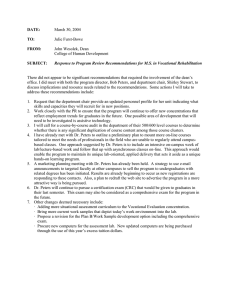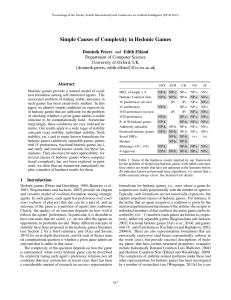
Proceedings of the Thirtieth AAAI Conference on Artificial Intelligence (AAAI-16)
Towards Structural Tractability in Hedonic Games∗
Dominik Peters
Department of Computer Science
University of Oxford, UK
dominik.peters@cs.ox.ac.uk
Abstract
Finding Friends is Hard
Hedonic games are a well-studied model of coalition
formation, in which selfish agents are partitioned into
disjoint sets, and agents care about the make-up of the
coalition they end up in. The computational problem of
finding a stable outcome tends to be computationally
intractable, even after severely restricting the types of
preferences that agents are allowed to report. We investigate a structural way of achieving tractability, by requiring that agents’ preferences interact in a well-behaved
manner. Precisely, we show that stable outcomes can
be found in linear time for hedonic games that satisfy a
notion of bounded treewidth and bounded degree.
Annoyingly, the problem of finding a core-stable partition in
a hedonic game as just described has turned out to be computationally hard in almost all cases. In order to make this
claim precise, we need a way to succinctly represent agents’
preferences over the exponential space of all coalitions. An
influential and universally expressive way to do this are hedonic coalition nets (or HC-nets), introduced by Elkind and
Wooldridge (2009), in which agents are characterised by a list
of weighted boolean rules: for example, the rule b ∧ ¬c →a 3
means that agent a derives utility 3 in coalitions that include
agent b but not c. The total utility of a in a coalition S is the
sum of the weights of all rules satisfied in S.
As Elkind and Wooldridge (2009) show, deciding whether
a game given by an HC-net admits a core-stable outcome is
Σp2 -complete. This comes as a blow to the project of finding
stable outcomes: the problem encapsulates the full hardness
of the second level of the polynomial hierarchy, and is thus
considerably harder than ‘merely’ NP-complete problems.
What can be done? A natural and initially promising approach was to restrict agents’ preferences: what if, for example, agents’ preferences are additively separable? Here,
agents assign other agents numbers vi (j) and evaluate
coali
tions according to the sum of the values in it: j∈S vi (j).
Alas, this does not make finding stable solutions easier:
Introduction
A coalition is an alliance between a group of individuals,
formed in order to achieve a common goal. How do such
coalitions form if agents are selfish? An extensive literature
in economics and computer science has studied this question
using the natural model of a hedonic game (see the survey by
Aziz and Savani (2016)). A hedonic game consists of a set
N of agents, each of which submits a (complete, transitive)
preference ordering i over all possible coalitions S ⊆ N
with i ∈ S. An outcome of the game is a partition of the
agent set N into disjoint coalitions: agents like a partition π
exactly as much as they like their coalition S in π. If agents
are selfish, we want to find a stable outcome, while in other
situations a welfare-optimal or fair outcome might be desired.
Formally, a partition π is core-stable if it is resistant to
group deviations: there is no non-empty coalition S ⊆ N
such that S i π for all i ∈ S. It is strict-core-stable if there
is no non-empty S ⊆ N such that S i π for all i ∈ S,
with at least one preference strict. Given a game, we wish to
find a partition that is core-stable. To study the computational
complexity of this, we will consider the decision problem of
whether a given hedonic game admits any such outcome.
Here, we study what kind of restrictions on the structure of
the hedonic games involved can be used to make this problem
tractable, and argue that restrictions on the entire preference
profile rather than individual preferences are most promising.
Theorem 1 (Peters 2015). The problems of deciding whether
a given additively separable hedonic game admits a coreor a strict-core-stable partition are Σp2 -complete, even if
valuations are symmetric (vi (j) = vj (i)) and sparse: no
agent has non-zero valuations for more than 10 agents.
This result is an extension of a result of Woeginger (2013).
An impressive number of other preference restrictions have
been studied, and invariably NP-hardness remains: in particular, this is the case when agents only care about their most
or least preferred agent in a coalition (Hajduková 2006), or
if agents take the average of the vi (j) rather than the sum
(Brandl, Brandt, and Strobel 2015), and Σp2 -hardness remains
for the strict core even if preferences are dichotomous (Peters
2015). Indeed, finding a core-stable outcome must remain
hard for all (succinct) preference representations which allow
agents a minimum of expressive freedom, in that they are
allowed to arbitrarily rank coalitions of form {i, j} and they
are allowed to dislike some players (Peters and Elkind 2015).
∗
This is a ‘student abstract’ based on material in Peters (2016a;
2016b; 2015). I wish to thank Edith Elkind for advice and guidance.
c 2016, Association for the Advancement of Artificial
Copyright Intelligence (www.aaai.org). All rights reserved.
4252
The problem usually remains hard even after imposing further
conditions such as symmetry, strictness, or sparseness.
Boolean
2-lists
3-lists
4-lists
Anonymous
Intervals
Roommates
Majority
Structural Tractability: Bounded Treewidth
Despite some isolated positive results – some examples for
dichotomous preferences can be found in Peters (2016a) and
are summarised in Table 1 – it seems fair to conclude that
the approach of identifying restrictions on individual agents’
preferences to allow tractability has substantially failed. An
alternative method of attack is needed, and here we propose a
structural one. The idea is to consider subclasses of hedonic
games in which agents’ preferences are correlated in that
they, taken together, appear structured. As a somewhat trivial
example, consider the common ranking property of Farrell
and Scotchmer (1988), where every agent’s preference agrees
with a common ranking of all coalitions. As can be easily
seen, successively picking top coalitions according to the
common ranking yields a core-stable outcome.
More interestingly, let us consider the idea that cyclicity
can be viewed as a main source of hardness, so that minimising the occurrences of cyclic relationships in a problem
might make it easier. (Indeed, it is notable that essentially
all examples of hedonic games that do not admit stable outcomes depend on an odd number of agents placed in a cycle.)
A particularly successful way of limiting cycles is through
bounding the treewidth of an underlying graph describing
the problem instance. The treewidth of a graph is a measure
of how ‘tree-like’ a given graph is – for definitions and an
overview we refer the reader to Bodlaender (1994).
In particular, for a game given by an HC-net, we can define
a natural dependency graph G with vertex set N the agents,
where an edge connects i and j if j appears in a rule of
agent i. Thus, agents that care about each other’s presence are
connected in G. Elkind and Wooldridge (2009) asked whether
finding core-stable outcomes becomes tractable restricted to
games whose dependency graph has bounded treewidth. As
we show, the answer in general is no, since deciding the
existence of a core-stable partition remains hard for games
of treewidth 2 (Peters 2016b). However, tractability arises
once we additionally bound the maximum degree of G. This
tractability is not restricted to just core-stability: a wide range
of other computational questions can be efficiently answered
on such a domain, allowing us to find partitions that are, for
example, envy-free or Pareto-optimal.
SW
PF
PO
NS
IS
CR
SCR
NP-c.
NP-c.
NP-c.
NP-c.
NP-c.
P
P
?
NP-c.
P
NP-c.
NP-c.
NP-c.
P
P
P
NP-h.
P
NP-h.
NP-h.
NP-h.
P
P
?
NP-c.
P
?
NP-c.
NP-c.
?
NP-c.
P
P
P
P
P
P
P
P
P
FNP-h.
P
P
P
P
P
P
P
Σp2 -c.
NP-c.
NP-c.
NP-c.
NP-c.
?
P
P
Table 1: Complexity results for various dichotomous preference representations, see Peters (2016a) for details.
Future Work
The notion of structural tractability suggests multiple avenues
for potentially fruitful future work. As an example, suppose
agents are ordered along a line, and have additively separable
preferences that are single-peaked on that line: agents prefer
those agents closer to them on the line. Does every such
game admit a core-stable outcome? If so, can we find it in
polynomial time? Similarly, what happens if all individually
rational coalitions are intervals with respect to this line?
Some positive results for the dichotomous case can be found
in Peters (2016a). In other possible models, agents may be
points in a metric space, and may prefer to be relatively
‘central’ in their coalition.
More directly related to the results presented here, we may
ask whether runtime improvements are possible for preferences of bounded treewidth that are additionally restricted in
some ‘traditional’ way. In particular, can we dispense with
the bound on G’s maximum degree when only considering
additively separable games?
References
Aziz, H., and Savani, R. 2016. Hedonic games. In Handbook of
Computational Social Choice. Cambridge University Press.
Bodlaender, H. L. 1994. A tourist guide through treewidth. Acta
cybernetica 11(1-2):1.
Brandl, F.; Brandt, F.; and Strobel, M. 2015. Fractional Hedonic
Games: Individual and Group Stability. AAMAS ’15, 1219–1227.
Elkind, E., and Wooldridge, M. 2009. Hedonic coalition nets.
AAMAS ’09, 417–424.
Farrell, J., and Scotchmer, S. 1988. Partnerships. The Quarterly
Journal of Economics 279–297.
Hajduková, J. 2006. Coalition Formation Games: A Survey. International Game Theory Review (IGTR) 08(04):613–641.
Peters, D., and Elkind, E. 2015. Simple causes of complexity in
hedonic games. IJCAI ’15, 617–623, arXiv:1507.03474 [cs.GT].
Peters, D. 2015. Σp2 -complete problems on hedonic games.
arXiv:1509.02333 [cs.GT].
Peters, D. 2016a. Complexity of hedonic games with dichotomous
preferences. AAAI ’16.
Peters, D. 2016b. Graphical hedonic games of bounded treewidth.
AAAI ’16.
Woeginger, G. J. 2013. A hardness result for core stability in
additive hedonic games. Mathematical Social Sciences 65(2):101–
104.
Theorem 2 (Peters 2016b). For any logical sentence φ of
HG-logic that may quantify over (connected) partitions, coalitions, and agents, the problem of deciding whether a hedonic game given by an HC-net satisfies φ is fixed-parameter
tractable with parameters the treewidth and degree of the
dependency graph of the game.
Proof idea. Encode HG-logic into monadic second-order
logic, and use Courcelle’s theorem.
As an example, φ ≡ ∃π ∀S ∃i (i ∈ S ∧ π i S) encodes the existence of a core-stable partition. This result is
encouraging in that it applies to many concepts φ and does
not depend on severe restrictions on individual agents’ preferences who may use any HC-net subject to the degree bound.
4253









